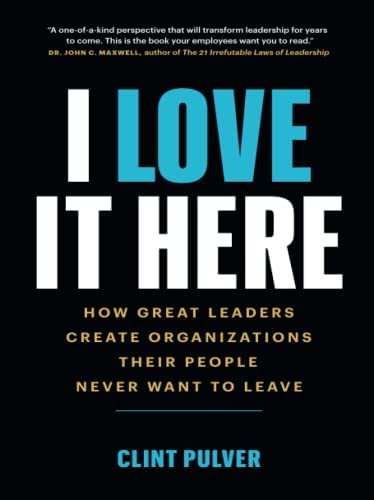INSIDER: I Love It Here
Parker Cannon, MBA Candidate
In today’s work environment, millennial and Generation Z employees are more likely to job hop than any other generations. High turnover rates mean that companies are losing out on valuable developed skills and retained knowledge. The Work Institutes 2020 Retention Report indicates that turnover increased 88% since 2010, and by 2023, more than one in three workers will voluntarily quit their job. Forbes estimates that replacing an employee can cost a firm 50% of an entry-level employee’s salary and 125% of a mid-level employee’s salary.
In I Love it Here: How Great Leaders Create Organizations Their People Never Want to Leave, Clint Pulver leverages insights from his research program, Undercover Millennial, where interviewers posed as prospective hires and asked employees questions about job satisfaction. Pulver uses these insights to develop leadership principles that help create organizations that people “never want to leave.”
THINK POINT #1: Creating Your Dream Team
Building a dedicated and engaged workforce facilitates success, and it all starts with hiring. Through research and observation of hiring processes, Pulver narrowed the keys to effective hiring practices to four basic principles.
- 1. Hire the right person, not the convenient person.
It's common for hiring managers to get caught up in the rush to meet deadlines. This sometimes leads to firms hiring the first candidate rather than the best candidate. People are the foundation of the firm, so remember that the first interviewee may not be the candidate with the right experience, abilities, and attitude, but waiting on the right candidate will pay dividends in the long run.
- 2. Hire internally if possible.
Internal candidates have existing relationships within the organization and a grasp of the culture and workplace dynamics. This often gives internal candidates the the ability to step into a role with an advantage over any external candidate. More importantly, hiring internally promotes excitement for growth within the company and promotes engagement and loyalty.
- 3. Hire for the ABCs: attitude, behavior, and character.
Hiring for the ABC qualities is, at the very least, as important as technical ability. Technical skills can often be taught, but character is much more difficult to mold. Often, resumes don’t effectively display these characteristics, which is why asking the right questions during interviews is imperative.
- 4. Let your employees focus on what they do best.
If you want active engagement from an employee, set them up for success. This isn’t to say that firms shouldn’t challenge employees, but using one’s natural abilities will improve performance, increase engagement, and fuel development.
THINK POINT #2: Mentor Manager: Managing with Empathy and Expectations
Pulver identifies two factors as a common thread among successful managers in almost every organization: personal connection with employees and clear expectations set for employees. The level of connection is a result of consistent empathy, kindness, care, and trust displayed. In addition, employees value clear expectations and an understanding of the standards and outcomes for their roles. Some examples of what different displays of these factors may look like and lead to include:
- Removed Manager (low expectations, low connection): The removed manager seems removed from the organization and view leadership as a burden. This results in employees feeling undervalued and often leads to employees searching for new employment.
- Buddy Manager (low expectations, high connection): The buddy manager values approval and friendship more than leading and empowering employees to be better. This leadership style may result in employees taking advantage of relationship, leading to decreased productivity and lack of development.
- Controlling Manager (high expectations, low connection): The controlling manager is rigid and has a forceful management style. This type of management often leads to rebellion, outward defiance, and variations of deliberate rule breaking. This style results in loss of productivity and turnover.
- Mentor Manager (high expectations, high connection): The mentor manager is the most effective leadership style. Mentor managers create engagement and foster an environment of respect and loyalty through building trust and a genuine connection with employees while pushing them to reach their greatest potential.
As a leader in an organization, you will be watched, and others will categorize you as a supervisor or a mentor. Therefore, becoming a Mentor Manager should be an aspiration of any person in leadership.
THINK POINT #3: Sparking the Possibility
Pulver explains that great mentors can “communicate someone’s potential and worth so clearly that the person begins to recognize the potential and worth in themselves.”
Sometimes it is difficult to see what lies right in front of us. You have the opportunity to alter and mold perceptions of those who work with you and who work for you. Helping someone to recognize their worth requires 1) recognition and 2) opportunities for growth. Without these, your employees may find it difficult to find worth in their work, diminishing their potential for success. As a mentor manager, it is your responsibility to create an environment that fosters recognition and opportunities for growth.
Recognition can be given in many ways. Bonuses are effective, but they are not the only way to give recognition. Younger employees are progressively valuing experiences of things. An alternative to cash bonuses could include tickets to sporting events, concerts, plays etc. Often, vocal praise is valued by an employee more than free food or a celebratory event. There are many ways to express praise or recognition, but the most important part is actually doing it.
Opportunities for growth start by acknowledging the need for growth. Through his research, Culver notes the following types of growth opportunities and results:
- Call out potential: Look for good in others and call it out
- Make simple investments: Offer a book or recommend an informative TED talk
- Encourage growth: Arrange trainings, speakers, and workshops
- Offer advocacy: “Connect people to their dreams”
By showing employees their potential and worth, you create an environment for growth and engagement, as well as foster intrinsic motivation in your team members. These acts bring humanity into the workplace while simultaneously supporting your potential as a manager.
Real Estate Implications
Creating a workplace that employees love is foundational to any successful organization, and real estate is no exception. Through effective management, you can create an environment where your employees engage, grow, and never want to leave. Hire the right candidates for the job to build a strong foundation. Be a Mentor Manager by connecting with your employees and communicating clear expectations. Foster an environment of engagement through recognition and developmental growth opportunities. Through these actions you, too, can create a workplace that will make your employees say, “I love it here.”
. . . . . . . . . . . . . . . . . . .
Recommended Reading
Pulver, Clint (2021), I Love It Here, Page Two Books, Inc: BC, Canada.
. . . . . . . . . . . . . . . . . . .
About the Authors
Parker Cannon, MBA Candidate
Baylor University
Parker Cannon is a graduate student from Waco, Texas. He earned his Bachelor of Science in Chemical Engineering from Louisiana State University. Prior to beginning graduate school at Baylor, Parker worked for three years as a chemical sales representative and operations consultant at a Chevron refinery. Parker is currently seeking an MBA degree with a concentration in finance to pursue a career in financial services.

